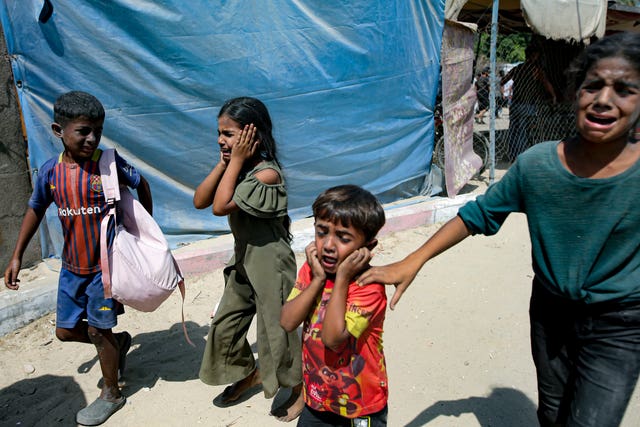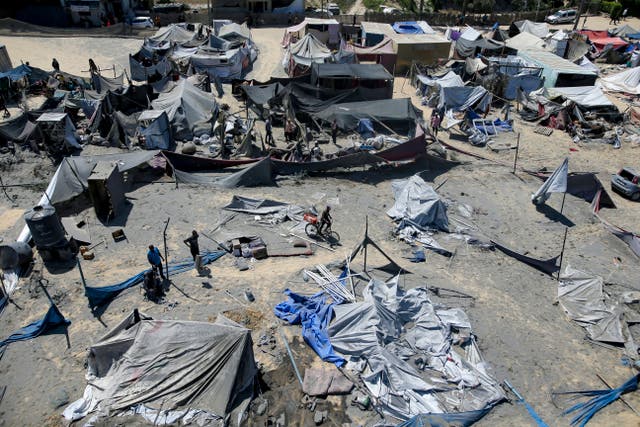Israeli strikes on Gaza kill more than 60 as sides consider new ceasefire deal
Earlier, Israeli police shot and killed a Palestinian teenager from the Gaza Strip after he stabbed a police officer in the occupied West Bank.

Israeli air strikes have killed more than 60 Palestinians in southern and central Gaza, including one that hit an Israeli-declared “safe zone” crowded with thousands of displaced people.
The day’s deadliest strike came on Tuesday afternoon, hitting near a fuel station outside the southern city of Khan Younis in Muwasi, a coastal region that is part of the humanitarian “safe zone” where the Israeli military has told Palestinians to take refuge to escape offensives elsewhere.
Officials at Khan Younis’ Nasser Hospital said 17 people were killed. Nearby areas are packed with tent camps.
Apparently referring to the strike, the Israeli military said in a statement that it targeted a commander in Islamic Jihad’s naval unit west of Khan Younis. It said it was looking into reports that civilians were killed.

It occurred in the same area where Gaza health officials said more than 90 Palestinians, including children, were killed by a strike on Saturday that Israel said was targeting Hamas’s top military commander, Mohammed Deif. His status remained unclear.
The new air strikes came as Israel and Hamas continued to weigh the latest ceasefire proposal. Hamas has said talks meant to wind down the nine-month war would continue even after Israel targeted Deif.
International mediators are working to push Israel and Hamas towards a deal that would halt the fighting and free about 120 hostages held by the militant group in Gaza.
Other strikes hit in the Nuseirat and Zawaida refugee camps of central Gaza.
Strikes on four houses killed at least 24 people, including 10 women and four children. Another hit a school-turned-shelter in Nuseirat, killing at least nine.
An Associated Press journalist saw the bodies as they were taken to the Al Aqsa hospital in the nearby town of Deir al-Balah, where hospital officials provided the death count.

Another hit a UN school in Nuseirat where families were sheltering, killing at least nine. AP footage showed the school’s yard covered in rubble and twisted metal from a structure that was hit.
Israel’s military said Hamas militants were operating from the school to plan attacks. Its claim could not be independently confirmed.
Other strikes in Khan Younis and the southern city of Rafah overnight on Monday and on Tuesday killed 12 people, according to medical officials and AP journalists. An AP journalist counted the bodies at the hospital before a funeral was held at its gates.
The military said air force planes had struck some 40 targets in Gaza over the past day, among them observation posts, Hamas military structures and explosives-rigged buildings.
The war in Gaza, which was sparked by Hamas’s October 7 attack, has killed more than 38,600 people, according to the Hamas-run Health Ministry, which does not distinguish between combatants and civilians in its count.
The war has created a humanitarian catastrophe in the coastal Palestinian territory, displaced most of its 2.3 million population and triggered widespread hunger.

Hamas’s October attack killed 1,200 people, mostly civilians, and militants took about 250 hostage. About 120 remain in captivity, with about a third of them believed to be dead, according to Israeli authorities.
Violence has also surged in the West Bank. On Tuesday a Palestinian stabbed an Israeli police officer, wounding him lightly, before another officer opened fire, killing the assailant who was identified as a 19-year-old from Gaza.
Meanwhile, the Israeli military has said it will begin sending draft notices to Jewish ultra-Orthodox men next week – a step that could destabilise Prime Minister Benjamin Netanyahu’s government and trigger more large protests in the community.
The announcement followed a landmark Supreme Court order for young religious men to begin enlisting for military service. Under long-standing political arrangements, ultra-Orthodox men had been exempt from the draft, which is compulsory for most Jewish men.
The exemptions created resentment among the general public in Israel, especially after more than nine months of war against Hamas militants in Gaza.
The army summons is the beginning of a months-long enlistment process that can be difficult to enforce if there is large-scale refusal to comply. The army did not say when it expects ultra-Orthodox men to begin serving or how many men were receiving the new notices.
The court ruled that the system of exemptions, which allow religious men to study in Jewish seminaries while others are forced to serve in the army, was discriminatory. Ultra-Orthodox leaders say religious study is equally important for the country’s future and that their generations-old way of life will be threatened if their followers serve in the army.
Mr Netanyahu’s government relies on the support of ultra-Orthodox parties that oppose changes to the system. Religious leaders have not said what steps they will take. If they leave the ruling coalition, the government would likely topple and the country would be plunged into early elections two years ahead of schedule.





